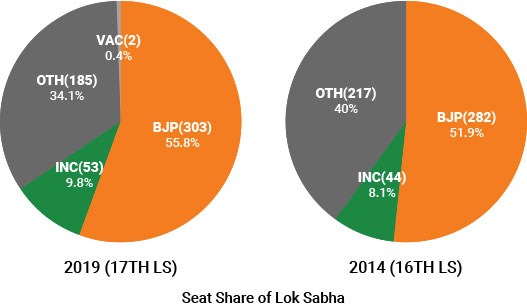
One of the core pillars of a democratic nation’s legislative setup is a strong Opposition. An elected government can shape national policies through its majoritarian strength in the Parliament. The decisions can often be construed as biased and favoring a specific ideological purpose. The Opposition, in turn, provides the check and balance to the government by presenting alternative viewpoints. A constructive debate leads to well-balanced policies and decisions that benefit the citizens at large.
Opposition strength in the Lok Sabha
The seat share of BJP and the Congress Party in the 16th and 17th Lok Sabha of 2014 and 2019 respectively are as below:

The Lok Sabha, Lower House of the Parliament, has been without a Leader of the Opposition since 2014. In order to occupy the seat of the Opposition, a party needs to have a minimum of 10% of the seats individually.
The 17th Lok Sabha that took office in May 2019 has 543 members of which the BJP holds 303 seats, and the Indian National Congress (Congress Party) has only 53 seats (9.8%). The 16th Lok Sabha formed post the elections in 2014 too had no Leader of the Opposition as Congress, being the second-largest party could not get a minimum of 10% of the seats individually.
Impact of a weakened Opposition
The BJP-led NDA government, accustomed to an Opposition-less Lok Sabha has been able to use its brute force in passing many bills without much debate or discussion. It has passed more Ordinances than the previous government. Some of the contentious bills were even passed as ‘Money Bills’ that didn’t even require them to be approved in the Rajya Sabha.
Some of the key bills/ordinances passed by the NDA government and unilateral decisions taken by it since 2014 are:
- Demonetisation: The Specified Bank Notes (Cessation of Liabilities) Ordinance, 2016 was issued on 28 December 2016, ending the liability of the government for the demonetised banknotes. The demonetisation exercise took out 85% of India’s banknotes from circulation with 4 hours’ notice and caused immeasurable personal and financial suffering to Indian citizens, some of which is felt until today. The exercise was deemed a failure as 99.3% of all demonetised banknotes were again deposited with the banks thereby busting the myth of trapping ₹4-5 trillion of black money.
- Electoral Bond Bill: An electoral bond is like a promissory note that can be bought by any Indian citizen or company incorporated in India, the amount of which can then be transferred to the electoral account of a political party as a donation. An electoral bond is often regarded as a “black hole” as the funds are untraceable. Electoral Bonds worth ₹5,170 crores were donated to India's 8 national political parties between Apr 2017 and Mar 2020. Of these, 82% were to BJP. Given BJP’s lack of majority in Rajya Sabha, where the Electoral Bond was bound to be challenged on technical grounds, the BJP government passed it as a Money Bill which only requires the approval of the Lok Sabha, where they had a majority.
- New Farm Laws: The Centre promulgated three ordinances in the first week of June 2020 that meant to change the way India's farmers do business and sparked one of India's biggest protests and a nearly year-long standoff with the government.
- Appointment of the Lokpal: The rules state that the appointment of the Lokpal (an anti-corruption ombudsman) must include the support of the Leader of the Opposition in Lok Sabha. The members of the Lokpal in 2019 were selected by a truncated panel of BJP members and BJP loyalists only as there was no Leader of the Opposition.
- Extension of CBI Chief’s Tenure: Section 4A of the Delhi Special Police Establishment Act of 1946 stipulates that the appointment of the CBI chief be done by the central government upon the recommendation of a committee comprising the Prime Minister, Leader of Opposition in Lok Sabha, and the Chief Justice of India. By extending the tenure of the CBI Chief through an ordinance, the BJP government has bypassed this committee and unilaterally appointed its chosen person to helm the premier crime investigative agency in India.
- Extension of ED Director’s Tenure: Article 25 of the Central Vigilance Commission Act of 2003 stipulates that the appointment of the ED Chief be done upon a recommendation from a committee comprising the chief vigilance commissioner, vigilance commissioner, home secretary, and the secretaries of the Department of Personnel and Training and Revenue. By extending the ED director’s tenure through an ordinance, the BJP government has bypassed this committee and allowed itself the unilateral right to have its chosen person lead the top financial crime investigation agency in India.
How has Congress failed itself and the Country?
Despite its many electoral failings, the Indian National Congress remains the biggest pan-national political party in India.

After the steady decline from 29% in 2009, the Congress Party yet holds almost 20% of the vote share across India. This is the second-biggest slice of the vote bank after BJP which commands 37% of the votes. AITC remains a distant third with just 4.1% of the national vote share.
At the state level too, the Congress party has lost over 12 states in the last few years and currently has a ruling government only in the two states of Rajasthan and Chhattisgarh. It has not been able to sustain its partnership with any political party for long after bargaining for more than its deserved share of seats and then being unable to pull its weight. A case in point was the 2017 UP Assembly elections where its partnership with the Samajwadi Party collapsed after it won just 7 of the 114 seats it contested at a strike rate of just 6.1%.
It will be almost impossible for any political party to scale up and earn the loyalty of millions of voters within the next few years. Given BJP’s growing strength and the fragmentation of the various political parties, it is not far-fetched to assume that the BJP will retain power in 2024 for another 4-year term. Even if Congress were to drop its vote share by a few more percentage points, it will yet remain the primary contender for the position of the Opposition in 2024 and possibly 2028. If its track record over the last 2 General Elections were to be repeated, then the Lok Sabha looks to remain without the Leader of the Opposition for the next decade.
It is absolutely critical for the Congress party to understand its responsibility towards the nation. It willingly or unwillingly holds the power to shape the course of national politics and policies. It remains in a delusional bubble that the Gandhis alone can lead the party despite repeated rejections by the voters. As it stands, the Gandhis are BJP’s biggest asset – as long as they are at the helm, BJP gets a walkover. The state of disarray that Congress is in will not help itself win any seats but will instead end up cutting the vote share of other credible parties and decrease the chances of their winnability. It now has one of three options available to choose from:
- Reorganise itself and present its clear vision for India. It can do this by bringing seasoned politicians to take charge and pull themselves out of the morass it is in.
- Forge partnerships with other political parties and create a united “Opposition Front” without playing the big-daddy and bargaining for more seats than it can win. This could also mean allowing a PM candidate from another party to lead the front.
- Disband itself and get out of the way.
Unless the Congress party can get out of its perpetual “introspection mode” and take decisive actions, India’s policies and politics will remain tied to a single party’s political ideology and the Parliament will resemble its citadel. Unchecked power in the hands of a single party (BJP or any other party for that matter) can either lead to a glorious future for India or a complete collapse of its democratic setup that will take years to rebuild.
As they say, “The greater the power, the more dangerous the abuse.”
TO READ THE FULL ARTICLE

Get full access to the exciting content on The Mirrority by logging in
Support independent journalism
Even the very best of media houses in our country today are yielding to the pressure of click-bait journalism in order to survive. More than ever before, our country needs journalism that is independent, fair and non-pliant to the bureaucracy. Such journalism needs the support of like-minded readers like you to help us survive editorially and financially.
Whether you live in India or India lives inside you, help us continue to produce quality journalism with your contribution.
CONTRIBUTE
